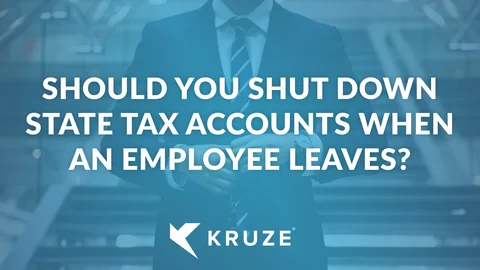
Should you shut down the relevant state tax accounts when a startup employee or co-founder leaves the company? Remote work has gained popularity in the last few years, and startups often rely on remote staff. Cash-strapped startups can often save money by not establishing a physical office. However, remote staff also create legal and taxing requirements that companies must follow.
What is state tax nexus?
State tax nexus is when the taxing authority of a particular state is applied to a startup’s sales or income. This is determined by factors such as the type and amount of business the company is conducting in that state. Other nexus factors include whether a company has employees and rents or owns property in a state.
In this particular scenario we are talking about the kind of nexus that is driven by having employees in a given state. States require you to register to do business and pay payroll taxes when you have employees in the state. Different states have different thresholds for the length of time employees have to work in that state before nexus is established – for example, in New York it’s 14 days.
This is a non-negotiable requirement for the states, and it’s crucial for startups to maintain tax compliance with a state when the company has employees there. It’s also important to note that even a single employee in a state can trigger this type of nexus. Startups typically have small staffs, so having a single employee in a state is a situation that often occurs.
What happens when an employee leaves?
If you have several employees in a state, you won’t need to consider closing your state tax accounts. However, when a co-founder or employee is the sole employee in a particular state and leaves your company, you then have to make a decision. Whether you close the account or keep it open and this is made based on two things:
- Do you want to save money now by shutting down those accounts? Or:
- Do you want to keep it open by spending a little bit more money, ensuring you don’t have to redo all of the work if you hire someone in that state in the future?
Factor high-tax states into your decision
High-tax states, like California and New York, require a lot of fees. Though remote work is much more common, a big percentage of the employees that work at a startup are likely to be in California and/or New York.
This is where the decision is made harder. If an employee leaves and you have no other employees in that state, be it California, New York, or wherever, you are welcome to shut down that account, and closing that could save your company money. But again, many potential employees might work in those states, and then you’d have to register with those states again.
Closing a State Tax Account
This is a process that will also take some time and money. You will need to:
- Alert the state tax authority
- File a final tax return
- File a surrender form (usually)
And typically you are going to have to pay your CPA firm, like us at Kruze Consulting, to handle all of this paperwork for you.
Don’t act immediately
If you make the decision to shut the account down but six months later you find the perfect candidate in state where you’ve just closed your accounts, you will have to go through the entire registration again. This is a scenario you want to avoid.
Our advice to founders planning on hiring in the near term is to keep the account open for a while. The life of a startup fluctuates and you just never know when things might take off and you need to hire a number of people in one of these states. Keeping the account open for the next six to nine months allows far greater flexibility.
Other issues could come up
There are also other potential problems that can occur because accounts have been closed to hurriedly in the attempt to save money. The accidental loss of paperwork, incorrect filing, or state agencies never actually receiving the documentation happens more than you would expect. Then you’ll spend even more time and money rectify mistakes.
The bottom line
To summarize:
- When you have even one employee working in a different state your company is required to open a state tax account.
- If that employee leaves, and you have no other employees in that state, you are free to close it.
- We recommend keeping that account open for a while until you know your future hiring plan and can make informed decisions.
- If you know you are going to hire in that state again, keep it open!
If you have any other questions about state tax compliance, startup accounting, startup bookkeeping, or venture capital fundraising please contact us.